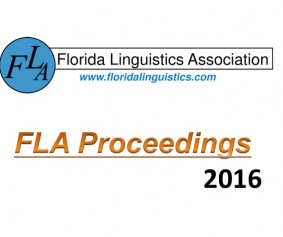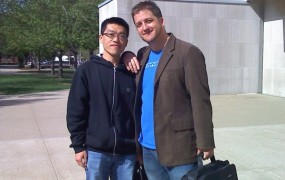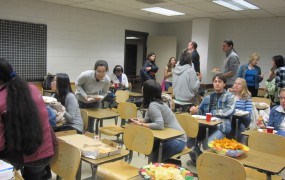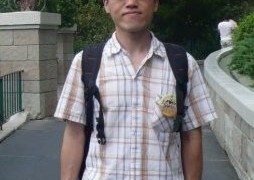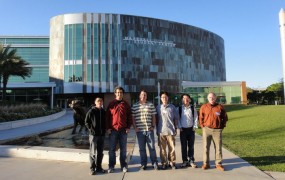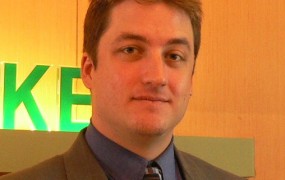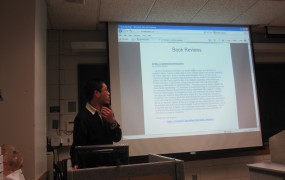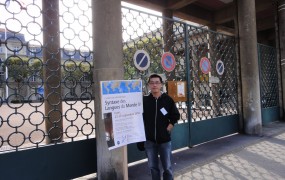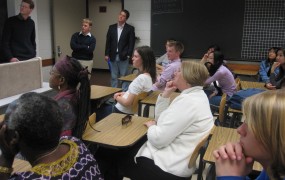Linguistics and Literature: Symmetry or Fiction?
Thursday, September 1st, 2016 @ 4:38AM
by Tyler McPeek, Ph.D., Assistant Professor, Nagoya University of Commerce and Business
*Note: this paper is part of the FLA Proceedings and has been accepted in revised and expanded form for inclusion in the 2017 FLA Journal of Language. Paper was presented: March 13, 2016. Gainesville, Florida, USA
I’ve been straddling the fence between creative writing (publishing poetry mainly, also short fiction) and linguistics for awhile now. I published my first book of poetry before I ever heard of “linguistics,” or at least before I understood what it was—I probably would have answered “stuff to do with language” as an answer to the question “What is linguistics?” (Sound familiar?) Or, perish the though, I might have even said “A linguist is a person who speaks a bunch of languages.” My second collection of poetry was released in 2013, just as I was finishing my Ph.D. in the Linguistics Department at the University of Florida. I had come a long way in my understanding of linguistics as an academic field, and my love of literature, creative writing, fiction, and poetry in particular, hadn’t waned—though it probably had changed in some ways, due at least in part no doubt to my newly gained scientific view of language.
I graduated from college with a BA in English Literature and a BFA in Creative Writing, after gearing up to be a medical doctor for most of my life, including my first 2-3 years as an undergraduate. With linguistics, I thought I had found a fresh, new, scientific way to play with language, one that allowed me to mesh my love of the beauty of language with my desire to discover, model, and analyze things in the natural world. Actually, I sometimes view the rift as being between Creative Writing (artistic production) and English Literature (criticism and analysis), rather than creative language (creative writing and literature appreciation together) and the scientific study of language (linguistics)—including theoretical modeling of sound and grammatical structure, anthropology of language, neurological, psychological, and pathological aspects of speech production, and other aspects that are encompassed in the scientific approach to language that “linguistics” represents as a field. Literature studies are typically seeking to open the box of creative literary work and examine the parts. Literary criticism and linguistics are not all that far apart on that point–looking to dissect the patient, just that literary studies are breaking down the works as a whole and linguistics is at the communicative language level—a bottom-up approach to the same task. The divide that I see is between creatives who want to leave the mystery of beauty through language intact, since that’s usually how it arrived to their pen, rather than considering the “colorless green ideas” as a Chomskian lab rat for syntax class–and worse, concluding that it is “semantically nonsensical, though grammatically correct.” Ditto on considering a novel as a ‘paradigm of post-colonial ambitions’ or the like, rather than an artistic work with only two primary, inherent phases to its biology—production and appreciation/consumption.
At the University of Florida, the English Department was just down the hall in the same building from the Linguistics Department (keep in mind this is on a gigantic campus with 9 libraries, multiple gyms, multiple Starbucks, museums, you name it). And not too far down the hall from there, with a little turn and a twist from English, was Creative Writing. Those two departments shared some faculty, no doubt—they likely shared a good bit of curriculum as well. Down the elevator from the 4th Floor of our large building and just across the street was a building with Asian languages inside, and next to that was a building that housed European and other languages. And in the basement of that building were sound laboratories and speech pathology, including the laboratory where I did my doctoral thesis experimentation on vocal typology, while a student completing the requirements of the Linguistics Department, not Speech Pathology. None of this geographical proximity on our large campus was a coincidence of course. The geography represents how the university community currently views the academic proximity of these fields. But yet, I had to slog my way well across to the other side of campus to Shands (the massive university hospital system) to get to the Rhoton Brain Laboratory (sadly Dr. Rhoton, a giant in his field, passed away recently) to participate in human brain dissection with brain surgeons from around the world. All this is probably why some linguistics programs around the country prefer to remain “programs,” rather than transitioning to formal “departments,” regardless of how big they become. When I was presenting at Purdue University as a graduate student, I was told that their Linguistics Program even encompassed the speech pathology folks. For many at University of Florida (which did transition from a program to a department some time ago, as an acknowledgment of its largess in faculty and student enrollment numbers) this academic inclusion would have been too broad of a definition of “linguistics.” Still, there were many speech pathology graduate students in my phonetics and phonology classes, and I eventually found myself in their laboratories, doing experiments on voice types. I was told once by my advisor that I had essentially strayed outside of “linguistics” as such with my research—though my committee was stilled packed with linguistics professors at my defense.
So, what does all this mean? Let’s return to the 4th Floor, where the Linguistics and English Departments shared the same hall. Despite the proximity, we couldn’t have been further apart. The difference was something akin to the difference of majoring in “English” in the United States and majoring in “English” in Europe or Asia, for example. An English major in the United States is typically assumed to be continuing the studies that they began in elementary school or junior high school—that is to say after “English” class stopped meaning prescriptive grammar and mechanics and started to mean the study of literature. So “English” is shorthand for “English Literature,” while “English” as a major in Asia, for example, continues to largely mean prescriptive grammar, usage, competence, communication, etc.—as opposed to reading and analyzing literature as a specialization. The second example (focus on language competency) is actually closer to “Linguistics” in nature and relevance than the first (literary criticism). In fact, the sole faculty member who was briefly shared between our two departments at UF, before he retired, was an EFL specialist. These days, second language acquisition forays outside our department are limited to another slog across campus to the Education Department, in which is housed the English Language Institute—where Linguistics Department graduate students can go for non-departmental Teaching Assistantships, field work, and classroom observation of practitioners for requirements related to SLA and ESL graduate certificates issued by the university. ESL, EFL, and SLA now have nothing at all to do with the English Department. That association retired along with the last faculty member who represented it. So the ties are severed completely now, though the geographical proximity remains. It might be easier to find animosity than kinship in that hallway. In the Linguistics Department, you might find, often self-unaware, dismissive attitudes towards literature—as happened to me in my first Syntax class, when I suggested that I found “colorless green ideas sleeping furiously” to be beautiful and that perhaps there was another layer to language that represented indefinable beauty, even a metaphysical layer. I was roundly slapped down by the professor, who suggested that I was “in the right field if I was looking for a fight.” I was too bewildered to respond, because it truly hadn’t been my intention to pick an intellectual “fight” with the professor. I honestly thought I was taking class discussion in an obvious direction that the instructor would appreciate and might have planned to address anyway. In the same way that two competing syntactic theories, after being judged to be equally sufficient in their ability to render consistently correct outcomes, can then be judged against each other on the criteria of “elegance”—which usually implies simplicity, but often involve an aesthetic evaluation as well, which is not always strictly scientific in nature. I think this concept of elegance of theory is a tip of the hat toward the limitations of science in language analysis. This was the answer I suspected I might receive in class. Not only was it not the one I received, it’s one I’ve never received from a theoretical syntactician or any other linguist in my graduate studies. Perhaps if there were a bridge between the departments intellectually, an outreached hand from one side of the hall to the other in ideology, it could be there. Sadly, even from the English Department, my old undergraduate academic home territory, there was on occasion a complete dismissal of linguistics. Perhaps not dismissed on its merit, but on its relevance. It was difficult to find a faculty member in the English Department over 40 who had taken even an introductory level undergraduate class in linguistics. This was disheartening, in no small part because second language English instructors and first language English mechanics instructors continue to be recruited from English departments in native speaking countries, not from the far smaller pool of linguistics departments. This means that language instruction, no matter how effective, talented, or passionate the instructor, continues to be taught with a strict prescriptive perspective and with a general unawareness of the scientific aspects of language that allow instructors to handle a host of questions and issues that arise while teaching students striving for basic competence in either their second of even first languages. This includes everything form accent correction to imparting a perspective that allows students to compare their own native language to others and understand the universal and non-universal aspects of human language and the linguistic limitations and uniting features of the human mind. This perspective is invaluable in a student’s strive toward competence in a language and an instructor’s ability to teach with maximum efficiency. The idea that many English departments in universities, English departments in high schools, and ESL programs are populated sometimes exclusively with people who have up to Ph.D. levels of education in the target language, but lack the background of even a single undergraduate class in linguistics is a travesty and an embarrassment. Most are even unaware that this is the case, as they don’t really know what linguistics is exactly. This could and should be corrected by requiring every undergraduate at every university to take at least an introductory level linguistics class as a requirement of any language major, even if it makes older faculty in English departments and elsewhere uncomfortable in becoming self-aware of their own hither-to-for intellectual deficits. This is harsh and comes across as self-righteous I’m sure, but I’m a person who came out of those shadows. I always thought I might continue on to a Ph.D. in English, and I believe I might have continued all the way through to a faculty posting without ever realizing what I was missing. For me, it is that important, and I’m confident that English Departments could retrain faculty who might have deficiencies in the new requirements and curriculum. Where should the growing number of Linguistics Ph.D.s find employment in academia? For one, in English Departments across the United States, and not just as ESL specialists. Every department needs at least one linguist to offer all of the undergrads a taste of the scientific side of language. Professors of literary theory and appreciation teaching mechanics and English as a second language, under the moniker of “English” is not cutting it.
Having said all that, back to the question at hand: Are linguistics and literature in conflict?
Of course, if one were just talking about appreciating literature as a reader, not as a literary criticism specialized academic or even as a creator of literary works per se, then there are other (though I think surmountable) challenges. The biggest is that linguistics training can lead to a kind of conscious attentiveness to the structure of language that is hard to switch off when it’s time to actually enjoy language holistically. On the extreme side, it can be hard to converse verbally at times without analyzing every sound and morphosyntactic structure that comes out of your ones mouth. It’s akin to talking on the phone or on Skype with a bad connection, where you hear your own voice repeated back to you on a one to two second delay while talking. Difficult to compose under those kind of conditions, difficult even to appreciate and savor. I suspect the same would be true of a linguist, in the analytical throws of composing a complex scientific paper, who takes a break to appreciate the musical flow of Steinbeck’s prose, or the verse of Wordsworth.. that’s a hard square to circle. I’ve chosen to explore this point of conflict as a research question—friction or symmetry? Optimistic minds like mine hope for the later, but that sure was a long few steps down the hall from my old Linguistics Department to the English Department at the University of Florida. Those few steps were longer in intellectual bridging than the slog across campus to the neurosurgery laboratories on campus, because in fact we had a neurolinguistics specialist in our department and many more that were interested in the field. While research and collaborative forays into neuroscience and neurosurgery were far from required of graduate students in our department, they were far more welcome than collaboration with the literati and creative writing types down the hall.
Posted by floridalinguistics
Categories: Featured, FLA Proceedings, Tyler McPeek

